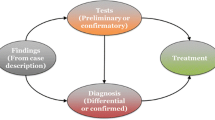Abstract
Retrieving relevant patient cohorts has the potential to accelerate clinical research. Recent evaluations have shown promising results, but also relevance measures that still need to be improved. To address the challenge of better modelling hospital visit relevance, we considered the impact of two forms of medical knowledge on the quality of patient cohorts. First, we automatically identified three types of medical concepts and, second, we asserted their belief values. This allowed us to perform experiments that capture the impact of incorporating knowledge of belief values within a retrieval system for identifying hospital visits corresponding to patient cohorts. We show that this approach generates a 149% increase for inferred average precision, a 36.5% increase of NDCG, and a 207% increase to the precision of the first ten returned documents.
Access this chapter
Tax calculation will be finalised at checkout
Purchases are for personal use only
Preview
Unable to display preview. Download preview PDF.
Similar content being viewed by others
References
Aronson, A.R.: Effective mapping of biomedical text to the umls metathesaurus: the metamap program. In: Proceedings of the AMIA Symposium, p. 17. American Medical Informatics Association (2001)
Chapman, W., Bridewell, W., Hanbury, P., Cooper, G., Buchanan, B.: A simple algorithm for identifying negated findings and diseases in discharge summaries. Journal of Biomedical Informatics 34(5), 301–310 (2001)
Cilibrasi, R., Vitanyi, P.: The google similarity distance. IEEE Transactions on Knowledge and Data Engineering, 370–383 (2007)
Committee on Comparative Effectiveness Research Prioritization, Institute of Medicine (US): Initial national priorities for comparative effectiveness research. National Academies Press (2009)
Fellbaum, C.: WordNet: An Electronic Lexical Database. The MIT press (1998)
Goodwin, T., Rink, B., Roberts, K., Harabagiu, S.: Cohort shepherd: Discovering cohort traits from hospital visits. In: The Twentieth Text REtrieval Conference Proceedings, TREC 2011 (2011)
Hatcher, E., Gospodnetic, O.: Lucene in Action. Manning Publications (2005)
Roberts, K., Harabagiu, S.: A flexible framework for deriving assertions from electronic medical records. Journal of the American Medical Informatics Association 18(5), 568–573 (2011)
Schuyler, P., Hole, W., Tuttle, M., Sherertz, D.: The umls metathesaurus: Representing different views of biomedical concepts. Bulletin of the Medical Library Association 81(2), 217 (1993)
Voorhees, E., Tong, R.: Overview of the trec 2011 medical records track. In: The Twentieth Text REtrieval Conference Proceedings (TREC 2011). National Institute for Standards and Technology, Gaithersburg (2011)
Author information
Authors and Affiliations
Editor information
Editors and Affiliations
Rights and permissions
Copyright information
© 2013 Springer-Verlag Berlin Heidelberg
About this paper
Cite this paper
Goodwin, T., Harabagiu, S.M. (2013). The Impact of Belief Values on the Identification of Patient Cohorts. In: Forner, P., Müller, H., Paredes, R., Rosso, P., Stein, B. (eds) Information Access Evaluation. Multilinguality, Multimodality, and Visualization. CLEF 2013. Lecture Notes in Computer Science, vol 8138. Springer, Berlin, Heidelberg. https://doi.org/10.1007/978-3-642-40802-1_20
Download citation
DOI: https://doi.org/10.1007/978-3-642-40802-1_20
Publisher Name: Springer, Berlin, Heidelberg
Print ISBN: 978-3-642-40801-4
Online ISBN: 978-3-642-40802-1
eBook Packages: Computer ScienceComputer Science (R0)




